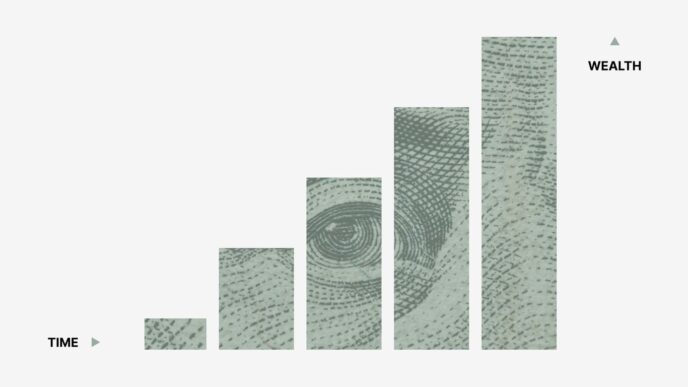The financial world is changing fast, and a lot of that has to do with tech companies. These businesses are making it easier and quicker for us to handle our money, whether that’s sending payments, managing budgets, or even getting loans. In the US, a bunch of these fintech companies are really leading the way. We looked at what’s been happening and picked out the top 10 fintech companies in the USA that are making a big impact and are worth keeping an eye on for 2025. They’re basically changing how we think about banking and finance.
Key Takeaways
- Fintech companies are changing how we deal with money using new tech.
- Expect more growth in AI, blockchain, and making financial services available to everyone in 2025.
- These companies focus on being fast, clear, and putting customers first.
- The fintech industry is growing quickly with new companies popping up.
- Many of these businesses are focused on helping more people get access to financial services and making things faster.
1. Stripe
Stripe has really made a name for itself in the world of online payments. It’s not just for small businesses anymore; a lot of big companies are using it too. Think about it, half of the Fortune 100 companies and a huge chunk of the Forbes Cloud 100 and AI 50 lists are on board. Companies like NVIDIA and PepsiCo rely on Stripe to handle their money stuff, which is pretty telling.
What’s really impressive is their growth. In 2024, the amount of money processed through Stripe went up by 38%, hitting a massive $1.4 trillion. That’s a significant chunk of the global economy, showing just how central Stripe has become. They also mentioned they were profitable in 2024 and expect to stay that way. It’s no wonder they’re valued at around $91.5 billion, making them the most valuable fintech startup out there right now.
Stripe offers a whole range of tools for businesses:
- Payment processing: They make it easy for customers to pay online.
- Billing solutions: Helps companies manage recurring payments and subscriptions.
- Fraud prevention: Tools to help protect businesses from fraudulent transactions.
- Financial reporting: Features to help keep track of finances.
Founded back in 2010, Stripe has grown incredibly fast. They’re known for making it simple for businesses to integrate payment systems into their websites and apps. Their focus on developers and providing robust APIs has been a big part of their success. It seems like they’re constantly expanding, and it’s worth keeping an eye on their progress in the fintech space, maybe even checking out what TechBullion has to say about them.
2. Chime
Chime really shook things up in the banking world, didn’t it? They started back in 2012 with this idea that banking should be straightforward and, well, free. No monthly fees, no minimum balances – it’s a pretty big deal for a lot of people. They don’t actually operate as a bank themselves, though. Instead, they team up with partner banks to make their services happen.
What’s cool is how they focus on making things easy through their mobile app. You can get your paycheck a bit early, and they even offer a way to cover small overdrafts without hitting you with a fee, up to $200. Plus, they have these features to help you save money automatically and even a secured credit card to help build your credit history. It’s no wonder they’ve attracted so many users, over 22 million by last year. They’ve managed to get a lot of investment too, with over $2.6 billion poured into the company. It seems like they’re getting ready to go public soon, which will be interesting to watch.
Chime is a great example of how technology can make financial services more accessible. They’ve really focused on the customer experience, and it shows. If you’re looking for a bank that skips the usual fees, checking out Chime’s banking services is probably a good idea.
3. Brex
Brex really changed the game for startups and growing businesses. They started out by offering corporate cards designed specifically for companies that were still pretty new, often without a long credit history. It was a big deal because traditional banks weren’t always keen on lending to these kinds of businesses.
What makes Brex stand out is how they bundle financial tools. It’s not just about a credit card anymore. They’ve built out a whole platform that includes expense management, bill pay, and even treasury services. This means a business can manage a lot of its financial operations right through Brex, which simplifies things a lot. They’re basically trying to be the all-in-one financial operating system for businesses.
Here’s a quick look at what they offer:
- Corporate Cards: Designed for startups, with features like no personal guarantee required and higher credit limits based on cash flow.
- Expense Management: Tools to track spending, set budgets, and manage reimbursements.
- Bill Pay: A way to pay vendors and manage invoices directly from the platform.
- Treasury Services: Helping businesses manage their cash and investments.
It’s pretty impressive how quickly they’ve grown and how many businesses rely on them. They’ve managed to capture a significant part of the market by focusing on the specific needs of companies that are scaling fast.
4. Plaid
Plaid is a company that really changed how we connect our bank accounts to all those cool apps we use. Think about it – whenever you link your bank to a budgeting app, a payment service, or even a new investment platform, there’s a good chance Plaid is the technology making that happen behind the scenes. They act as a secure bridge, letting you share your financial data without actually giving away your bank login details directly to every single app. It’s a pretty big deal for making fintech accessible.
Founded back in 2013, Plaid has grown quite a bit. They’ve built a network that connects to thousands of financial institutions, and their services are used by a ton of popular fintech companies, including some big names you’ve probably heard of. It’s estimated that about half of all Americans have used Plaid’s services in some way, which is wild when you stop and think about it.
Here’s a quick look at some of their key areas:
- Data Connectivity: This is their core business. They provide the tools (APIs) for developers to connect apps to user bank accounts.
- Identity Verification: Plaid also helps confirm that you are who you say you are, which is important for preventing fraud.
- Payment Initiation: They facilitate moving money between accounts, making transactions smoother.
Plaid’s role in the fintech ecosystem is pretty central, acting as the plumbing that allows many other services to function. Their valuation reflects this importance, sitting around $13 billion as of last year. They’ve seen significant growth, especially in areas like identity verification, which saw a huge jump in usage. It seems like as more people rely on digital finance, Plaid’s infrastructure becomes even more necessary.
5. SoFi
SoFi, which stands for Social Finance, started back in 2011. It was founded by a group of Stanford Business School grads who saw a need for better financial services, especially for student loans. Since then, it’s really grown into a big player in the fintech world.
SoFi aims to be a one-stop shop for people looking to get their finances in order. They offer a bunch of different products, not just student loan refinancing anymore. You can get personal loans, mortgages, and even look into investing services. They’ve really expanded their reach.
Here’s a quick look at what they’ve done:
- Funded Loans: They’ve helped over five million people by funding more than $50 billion in loans.
- Product Range: From personal loans and mortgages to investing and insurance, they cover a lot of ground.
- Innovation Recognition: They were even named one of the most innovative personal finance companies by Fast Company in 2023.
It’s pretty impressive how they’ve gone from focusing on student loans to offering such a wide array of financial tools. They’re definitely a company to watch in the fintech space, and you can check out their approach to financial services at SoFi’s website.
As of 2024, their market valuation was around $10 billion, and they brought in about $1.5 billion in revenue in 2023. They employ around 3,000 people, with Anthony Noto at the helm as CEO. It seems like they’re really focused on making finance more accessible for everyone.
6. Marqeta
Marqeta is a company that really changed how businesses handle payments. They provide a platform that lets companies issue and manage their own cards, which is pretty neat. Think about it – instead of just using a standard credit card, businesses can create custom payment solutions tailored to their needs. This flexibility is a big deal for companies looking to control spending or offer specific perks to their customers or employees.
They’re known for their modern approach to card issuing. This means they use technology to make things faster and more adaptable than older systems. Companies like DoorDash and Instacart use Marqeta’s services to power their payment programs. It’s all about giving businesses the tools to build unique financial experiences. They recently reported some solid financial results, showing a good jump in their total processing volume and gross profit, which tells you they’re doing something right.
Here’s a quick look at what makes them stand out:
- Customizable Card Programs: Businesses can design cards with specific rules and features.
- API-Driven Platform: This allows for easy integration with existing systems.
- Global Reach: They support businesses operating in various countries.
Marqeta’s focus on providing the underlying technology for card programs has made them a go-to partner for many innovative companies. It’s a behind-the-scenes kind of power, but it’s what makes a lot of modern payment services work smoothly. You can check out their financial performance for more details on their growth.
7. Synchrony Financial

Synchrony Financial, a company with roots stretching back to 1932, has carved out a significant niche in the financial services landscape. They’re known as the largest provider of private label credit cards in the United States, which is pretty impressive when you think about how many stores offer their own branded cards. It’s not just about credit cards though; their online banking division, Synchrony Bank, offers a variety of products aimed at helping people grow their money. Think high-yield savings accounts, CDs, and IRAs. They’ve been around for a long time, serving millions of customers, and have even picked up awards like the CIO 100 Award multiple times. It seems like they’ve managed to adapt and stay relevant in a constantly changing financial world, which is no small feat. As technology continues to reshape how we handle money, companies like Synchrony are working to keep pace with evolving regulations, much like other technology firms in the sector.
8. PayPal
PayPal is a name that pretty much everyone recognizes when it comes to online payments. It’s been around for ages, really, starting way back in 1998. They’ve built a massive global network, serving over 400 million active accounts worldwide. It’s kind of wild to think about how much they’ve grown from just a way to send money online to a full-blown financial services provider.
In 2023, PayPal brought in about $30 billion in revenue, which is a pretty big number. They make money through transaction fees and other services they offer. It’s not just about sending money to friends anymore; they’ve expanded into things like mobile payments and even letting people buy and sell cryptocurrency through their platform. Plus, their Venmo app is super popular for peer-to-peer payments.
PayPal has really cemented its place as a go-to for both consumers and businesses needing to move money digitally. They’ve got around 30,000 employees working to keep everything running smoothly. As the fintech world keeps changing, PayPal is looking to keep growing, especially in new markets. They recently shared some of their growth plans at the Jefferies 2025 Global FinTech Conference, which gives you an idea of where they’re headed. It’s clear they’re not slowing down anytime soon.
9. Flutterwave
Flutterwave is a big deal in the African fintech scene, and it’s making waves globally too. Founded in 2016, this company has processed a massive amount of transactions, helping out a huge number of customers across many African countries. What’s really cool is how they cater to businesses of all sizes, from small shops to larger enterprises. They’ve really focused on making payments easier for everyone involved.
Flutterwave has processed over 200 million transactions, totaling more than $16 billion. That’s a pretty wild number when you think about it. They’ve managed to build a platform that works for a lot of different businesses, which isn’t easy. It’s no wonder they’ve picked up a bunch of awards for being the best fintech company in Africa. They’re definitely changing how businesses operate financially on the continent and beyond. It’s worth keeping an eye on how they continue to grow and expand their services, especially as they look to broaden their reach.
10. Kiva
Kiva is a bit different from the other companies on this list. It’s a non-profit organization that started back in 2005, and its main goal is to connect people who want to lend money with borrowers who really need it, especially in developing countries where getting a bank loan isn’t easy. Think of it as a way for everyday people to help entrepreneurs, students, or families get a small business going, pay for school, or just improve their lives.
Since Kiva began, they’ve managed to crowdfund over $1.3 billion for loans. That money has gone to more than 3 million people across 90 different countries. It’s pretty amazing how a small loan, sometimes as little as $25, can make a big difference. They’ve been recognized for their work, even winning a Google Global Impact Award a while back. It really shows how technology can be used for social good, making financial inclusion a reality for many who are usually left out. You can check out their work and even make a loan yourself on the Kiva website.
Looking Ahead: The Ever-Evolving Fintech Landscape
So, that’s our look at some of the top fintech players making waves in the US for 2025. It’s pretty clear these companies aren’t just playing around; they’re really changing how we handle our money, making things faster and often easier. From online payments to new ways of banking, the innovation we’re seeing is pretty wild. It’s exciting to think about what’s next, especially with new tech like AI and blockchain becoming more common. These companies are definitely worth keeping an eye on as they continue to shape the future of finance, one app or transaction at a time.
Frequently Asked Questions
What exactly is fintech?
Fintech, short for financial technology, is all about using new tech to make money stuff easier and better. Think of apps that let you pay friends, invest your spare change, or manage your budget – that’s all fintech!
Why are these companies considered the top in the USA for 2025?
These companies are leading the way because they’re super innovative, growing really fast, and making finance more accessible for everyone. They’re changing how we bank, pay, and save money.
What kind of services do these top fintech companies offer?
They offer a wide range of services! This includes helping businesses accept online payments, providing banking services with no monthly fees, managing company expenses, connecting bank accounts to apps, and even helping people get loans or invest.
Are these companies only for businesses, or can individuals use them too?
Many of these companies serve both! While some focus on helping businesses with payments and expenses, others, like Chime or SoFi, offer banking and financial tools directly to individuals.
What makes a company stand out in the fintech world?
Companies that focus on making things simple, fast, and trustworthy for their users tend to do really well. Using new tech like AI and making sure everyone can access financial tools also helps them shine.
How is fintech changing the future of money?
Fintech is making financial services more convenient and often cheaper. It’s helping people who might not have used traditional banks before to manage their money, start businesses, and reach their financial goals.














